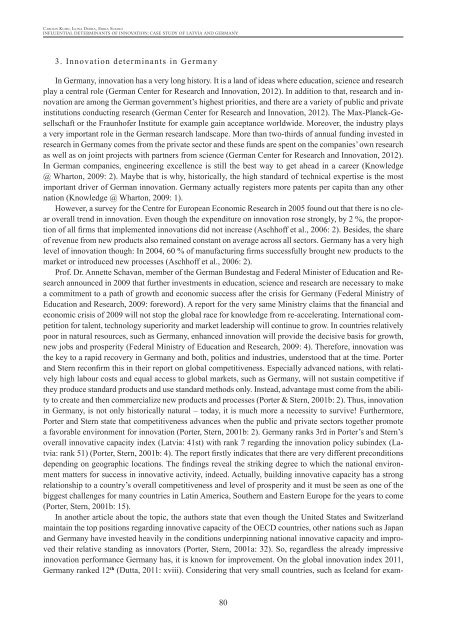regional formation and development studies - KlaipÄdos universitetas
regional formation and development studies - KlaipÄdos universitetas
regional formation and development studies - KlaipÄdos universitetas
You also want an ePaper? Increase the reach of your titles
YUMPU automatically turns print PDFs into web optimized ePapers that Google loves.
Carolin Kuhn, Ilona Dubra, Erika Sumilo<br />
INFLUENTIAL DETERMINANTS OF INNOVATION: CASE STUDY OF LATVIA AND GERMANY<br />
3. Innovation determinants in Germany<br />
In Germany, innovation has a very long history. It is a l<strong>and</strong> of ideas where education, science <strong>and</strong> research<br />
play a central role (German Center for Research <strong>and</strong> Innovation, 2012). In addition to that, research <strong>and</strong> innovation<br />
are among the German government’s highest priorities, <strong>and</strong> there are a variety of public <strong>and</strong> private<br />
institutions conducting research (German Center for Research <strong>and</strong> Innovation, 2012). The Max-Planck-Gesellschaft<br />
or the Fraunhofer Institute for example gain acceptance worldwide. Moreover, the industry plays<br />
a very important role in the German research l<strong>and</strong>scape. More than two-thirds of annual funding invested in<br />
research in Germany comes from the private sector <strong>and</strong> these funds are spent on the companies’ own research<br />
as well as on joint projects with partners from science (German Center for Research <strong>and</strong> Innovation, 2012).<br />
In German companies, engineering excellence is still the best way to get ahead in a career (Knowledge<br />
@ Wharton, 2009: 2). Maybe that is why, historically, the high st<strong>and</strong>ard of technical expertise is the most<br />
important driver of German innovation. Germany actually registers more patents per capita than any other<br />
nation (Knowledge @ Wharton, 2009: 1).<br />
However, a survey for the Centre for European Economic Research in 2005 found out that there is no clear<br />
overall trend in innovation. Even though the expenditure on innovation rose strongly, by 2 %, the proportion<br />
of all firms that implemented innovations did not increase (Aschhoff et al., 2006: 2). Besides, the share<br />
of revenue from new products also remained constant on average across all sectors. Germany has a very high<br />
level of innovation though: In 2004, 60 % of manufacturing firms successfully brought new products to the<br />
market or introduced new processes (Aschhoff et al., 2006: 2).<br />
Prof. Dr. Annette Schavan, member of the German Bundestag <strong>and</strong> Federal Minister of Education <strong>and</strong> Research<br />
announced in 2009 that further investments in education, science <strong>and</strong> research are necessary to make<br />
a commitment to a path of growth <strong>and</strong> economic success after the crisis for Germany (Federal Ministry of<br />
Education <strong>and</strong> Research, 2009: foreword). A report for the very same Ministry claims that the financial <strong>and</strong><br />
economic crisis of 2009 will not stop the global race for knowledge from re-accelerating. International competition<br />
for talent, technology superiority <strong>and</strong> market leadership will continue to grow. In countries relatively<br />
poor in natural resources, such as Germany, enhanced innovation will provide the decisive basis for growth,<br />
new jobs <strong>and</strong> prosperity (Federal Ministry of Education <strong>and</strong> Research, 2009: 4). Therefore, innovation was<br />
the key to a rapid recovery in Germany <strong>and</strong> both, politics <strong>and</strong> industries, understood that at the time. Porter<br />
<strong>and</strong> Stern reconfirm this in their report on global competitiveness. Especially advanced nations, with relatively<br />
high labour costs <strong>and</strong> equal access to global markets, such as Germany, will not sustain competitive if<br />
they produce st<strong>and</strong>ard products <strong>and</strong> use st<strong>and</strong>ard methods only. Instead, advantage must come from the ability<br />
to create <strong>and</strong> then commercialize new products <strong>and</strong> processes (Porter & Stern, 2001b: 2). Thus, innovation<br />
in Germany, is not only historically natural – today, it is much more a necessity to survive! Furthermore,<br />
Porter <strong>and</strong> Stern state that competitiveness advances when the public <strong>and</strong> private sectors together promote<br />
a favorable environment for innovation (Porter, Stern, 2001b: 2). Germany ranks 3rd in Porter’s <strong>and</strong> Stern’s<br />
overall innovative capacity index (Latvia: 41st) with rank 7 regarding the innovation policy subindex (Latvia:<br />
rank 51) (Porter, Stern, 2001b: 4). The report firstly indicates that there are very different preconditions<br />
depending on geographic locations. The findings reveal the striking degree to which the national environment<br />
matters for success in innovative activity, indeed. Actually, building innovative capacity has a strong<br />
relationship to a country’s overall competitiveness <strong>and</strong> level of prosperity <strong>and</strong> it must be seen as one of the<br />
biggest challenges for many countries in Latin America, Southern <strong>and</strong> Eastern Europe for the years to come<br />
(Porter, Stern, 2001b: 15).<br />
In another article about the topic, the authors state that even though the United States <strong>and</strong> Switzerl<strong>and</strong><br />
maintain the top positions regarding innovative capacity of the OECD countries, other nations such as Japan<br />
<strong>and</strong> Germany have invested heavily in the conditions underpinning national innovative capacity <strong>and</strong> improved<br />
their relative st<strong>and</strong>ing as innovators (Porter, Stern, 2001a: 32). So, regardless the already impressive<br />
innovation performance Germany has, it is known for improvement. On the global innovation index 2011,<br />
Germany ranked 12 th (Dutta, 2011: xviii). Considering that very small countries, such as Icel<strong>and</strong> for exam-<br />
80

















